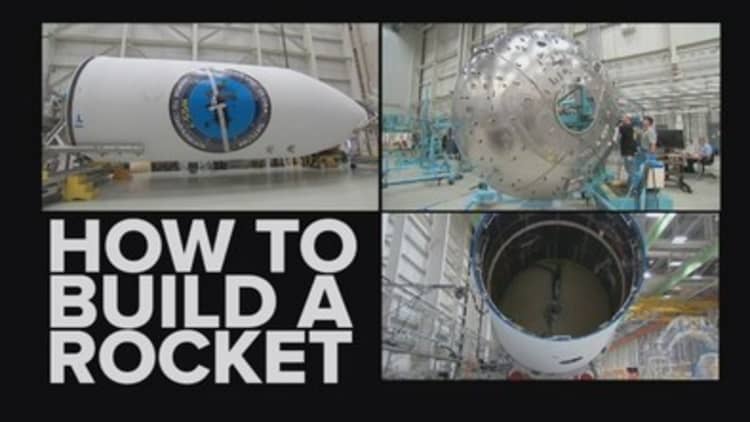
The rocket business has never been busier, and there's never been more competition.
For years, Lockheed Martin and Boeing dominated the launch business, and for the last decade, their two rocket systems—Delta and Atlas—have been married in a 50-50 joint venture called United Launch Alliance, or ULA.
ULA put all the GPS satellites into space, and it handles all U.S. military and top-secret launches.
Read MoreSpaceX, Elon Musk and the reusable rocket dream
That is about to change. In fact, everything about rockets is about to change.
As privately held SpaceX and its Falcon 9 rocket , ULA is about to reveal plans for a reusable, cheaper-to-operate rocket. CNBC has learned that the new ULA rocket will use a system currently called "SMART Reuse," and more details will be revealed next month at the Space Symposium trade show.
Reusability is the holy grail of the rocket business because of its potential to slash the cost of launches. SpaceX wants to make Falcon 9 reusable, and now ULA is trying to accomplish the same feat.
ULA is asking the public to vote on what the rocket's new name will be: Eagle, Freedom or GalaxyOne (which abbreviates to "GO").
"Competition is good for everybody, good for the taxpayer, healthy for the industry, and what really excites me about it is that space is becoming more accessible," said ULA CEO Tory Bruno inside the company's 1.6 million square foot manufacturing facility in Decatur, Alabama. CNBC received unprecedented access onto the factory floor, where tons of aluminum were milled, formed, coated, welded, insulated and assembled into about two dozen rockets.
The competition Bruno is talking about comes from SpaceX, owned by super-entrepreneur Elon Musk. The California-based rocket company will be competing directly with ULA soon, after dropping a lawsuit that accused the Pentagon of allowing ULA to hold a monopoly.
In a feisty hearing before Congress last week, Bruno and SpaceX President Gwynne Shotwell each defended their own company's perfect launch record, while criticizing the other. SpaceX launches cost an average of $160 million, while Bruno said ULA's average $225 million. (Tweet this)
"I don't understand how ULA is so expensive," Shotwell told the panel.
Read MoreElon Musk wants to use Seattle to get to Mars
ULA's price is coming down, the company says. "I'm here to transform the company, that's our mission," said Bruno. "ULA cut the price of launch in half. I'm going to cut it in half again, and I'm going to shorten the cycle time to launch to just a few months from what used to be several years."
The company's new rocket will have an American engine made by either Blue Origin, owned by Jeff Bezos, or Aerojet Rocketdyne. The Blue Origin engine will be ready for testing sooner, in 2019, and could be certified by 2022.
That's a problem for ULA. Currently, ULA's Atlas rockets are powered by a Russian engine that Congress said can no longer be used after 2019. During the gap time until a new rocket engine is certified, Bruno said it will be too expensive to fly only its own Delta rockets, so he may retire that program early.
That gives SpaceX an opportunity to have a monopoly on military launches for a few years, assuming it has the capability to handle all the payloads. If it doesn't, then the Pentagon may have no one to go to for launches. "I'm expecting Congress to give us a little more time," said Bruno, meaning he's hoping to buy a few more Russian engines.
Read More One giant leap for...private, inflatable space housing
Maybe Congress will, maybe it won't, but there's a sense in the ULA facility in Decatur that business as usual is over. "While we know that SpaceX is out there and doing what they're doing, and they're doing a fantastic job, we care more about what we're doing inside of our building," said engineering manager Bill Hallman.
"As long as we continue to do the things that we do, and make ourselves better," he said, "then we're not worried about competition at all."


